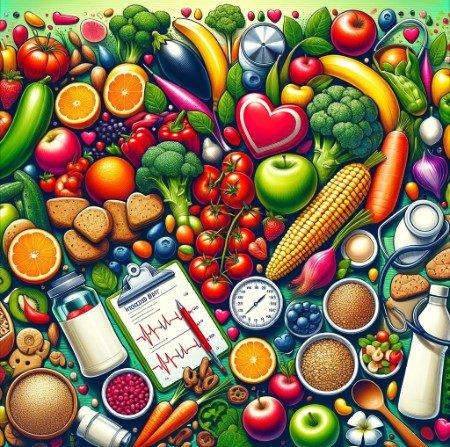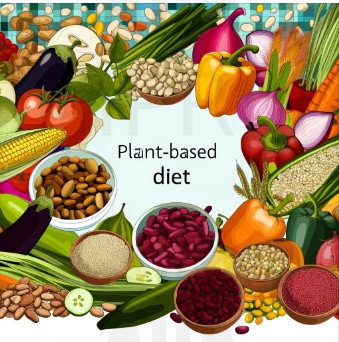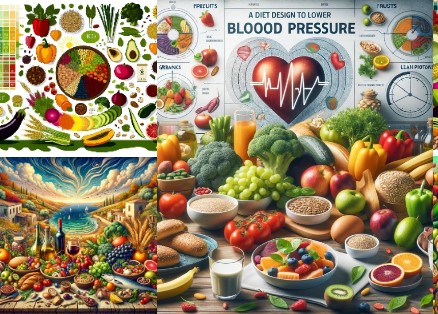What’s the Best Diet to Lower Blood Pressure?

Diet to Lower Blood Pressure is a critical concern for millions globally, seeking to improve their cardiovascular health and reduce the risk of hypertension-related complications. With the myriad of dietary options available, pinpointing the most effective strategy can be a daunting task. Enter the professional guidance of healthcare providers who recommend three standout diets: the DASH diet, the Mediterranean diet, and plant-based diets.
Each of these nutritional approaches offers unique benefits, focusing on whole foods, reducing sodium intake, and incorporating healthy fats and fibers that are key to managing blood pressure. In this blog post, we’ll delve into the specifics of these diets, compare their benefits, and provide practical tips for seamlessly integrating them into your daily routine. By understanding the principles behind these diets and making informed choices, individuals can embark on a path toward significantly improved health and well-being, all while keeping their blood pressure in check.
Table of Contents
What Causes High Blood Pressure?
Lifestyle and genetic factors play significant roles in the development of hypertension. This section illuminates the various contributors, setting the stage for the importance of dietary intervention.
High blood pressure, or hypertension, is a complex condition influenced by a combination of lifestyle, genetic, and environmental factors. Understanding these contributors is crucial for managing and preventing high blood pressure. Here’s a closer look at the main factors that play a role in the development of hypertension:
Lifestyle Factors
- Diet: A diet high in salt (sodium), saturated fats, and trans fats, and low in fruits, vegetables, and whole grains can contribute to elevated blood pressure. Consuming excessive amounts of alcohol or caffeine can also have an adverse effect.
- Physical Inactivity: Lack of regular physical activity can lead to weight gain and increased heart rate, both of which can raise blood pressure.
- Obesity: Being overweight or obese is a key risk factor for hypertension, as it can increase the strain on the heart and blood vessels.
- Alcohol and Tobacco Use: Regular, excessive consumption of alcohol can elevate blood pressure over time, while smoking tobacco can damage blood vessels and temporarily increase blood pressure.
Genetic Factors
- Family History: Individuals with a family history of hypertension are more likely to develop it themselves, suggesting a genetic component to the condition.
- Age and Gender: The risk of developing high blood pressure increases with age. Men are generally at a higher risk at a younger age, while women’s risk increases after menopause.
- Ethnicity: Certain ethnic groups, such as African Americans, have a higher prevalence of high blood pressure, suggesting genetic predispositions.
Environmental Factors
- Stress: Chronic stress can lead to temporary increases in blood pressure. Over time, these increases can become more permanent if not managed properly.
- Socioeconomic Status: Economic and social conditions can affect access to healthcare, healthy foods, and opportunities for physical activity, contributing to the risk of hypertension.
- Sleep Apnea: Conditions like sleep apnea, where breathing repeatedly stops and starts during sleep, can lead to secondary hypertension.
Medical Conditions
Certain chronic conditions can also increase the risk of developing high blood pressure, including:
- Kidney Disease: The kidneys play a crucial role in regulating blood pressure. Impaired kidney function can lead to fluid retention and increased blood pressure.
- Diabetes: High blood sugar levels can damage blood vessels, making it easier for arterial pressure to rise.
Understanding these factors highlights the importance of a holistic approach to managing blood pressure, which includes dietary intervention, regular physical activity, stress management, and, in some cases, medication. Adopting a healthy lifestyle can significantly reduce the risk of developing hypertension and its associated health complications.
Overview of Diet to Lower Blood Pressure.
Dietary approaches to stop hypertension (DASH), the Mediterranean diet, and plant-based diets are at the forefront of nutritional strategies to lower blood pressure. Each diet offers a unique blueprint for managing health.
The DASH Diet

The DASH diet is a balanced approach focusing on fruits, vegetables, whole grains, and lean proteins. Here, we explore the diet’s key components, including what foods to embrace and which to avoid, alongside the myriad benefits it offers.
The Mediterranean Diet

Characterized by its rich use of olive oil, fish, and fresh produce, the Mediterranean diet not only tantalizes the taste buds but also boasts substantial health benefits. This segment covers the essentials of adopting a Mediterranean lifestyle.
Plant-Based Diets

Emphasizing vegetables, fruits, legumes, and nuts, plant-based diets are gaining traction for their health benefits. This section details the diet’s core principles, beneficial foods, and potential health impacts.
Comparing the Diet to Lower Blood Pressure
This comparative analysis highlights the similarities and differences between the DASH, Mediterranean, and plant-based diets, evaluating their effectiveness in lowering blood pressure.
The DASH (Dietary Approaches to Stop Hypertension), Mediterranean, and plant-based diets are all recognized for their cardiovascular benefits, particularly in lowering blood pressure and improving overall heart health. While they share some commonalities, such as emphasizing whole foods and minimizing processed foods, each diet has its unique features and approaches to promoting health. Here’s a comparative analysis of these diets:
Similarities
- Focus on Whole Foods: All three diets emphasize whole foods, including fruits, vegetables, whole grains, and nuts, which are rich in vitamins, minerals, and fiber.
- Limited Processed Foods: They recommend limiting the intake of processed and high-sodium foods, which can contribute to high blood pressure and other health issues.
- Heart Health Benefits: Research supports that following any of these diets can improve heart health, lower blood pressure, and reduce the risk of cardiovascular disease.
Differences
- Dietary Composition:
- DASH Diet: Specifically designed to combat high blood pressure, it emphasizes fruits, vegetables, whole grains, lean protein, and low-fat dairy. It also recommends specific servings from different food groups and limits sodium intake to 2,300 mg a day (ideally 1,500 mg for greater blood pressure reduction).
- Mediterranean Diet: Focuses on the traditional eating patterns of countries bordering the Mediterranean Sea. It’s rich in fruits, vegetables, whole grains, olive oil, fish, and moderate wine consumption, with minimal red meat and processed foods. The Mediterranean diet is more a set of principles than a strict diet plan.
- Plant-Based Diets: Encompass a range of diets from vegetarian to vegan, emphasizing plant-derived foods while minimizing or excluding animal products. The focus is on fruits, vegetables, legumes, grains, nuts, and seeds, with variations in the inclusion of animal products among different types of plant-based diets.
Effectiveness in Lowering Blood Pressure
- DASH Diet: Numerous studies have found the DASH diet to be highly effective in lowering blood pressure, often within weeks of adoption. It is particularly beneficial for individuals with hypertension or prehypertension.
- Mediterranean Diet: While not specifically designed for blood pressure management, the Mediterranean diet has been associated with reduced blood pressure levels and a lower risk of cardiovascular disease, likely due to its emphasis on healthy fats and low saturated fat intake.
- Plant-Based Diets: These diets can also lead to reductions in blood pressure, attributed to high fiber, low fat, and the antioxidant-rich nature of plant-based foods. The degree of blood pressure reduction can vary depending on how strictly animal products are limited.
Choosing between the DASH, Mediterranean, and plant-based diets may come down to personal preferences, specific health goals, and dietary restrictions. All three diets offer substantial health benefits, including the potential to lower blood pressure. However, the DASH diet is the most specifically targeted towards hypertension management. Meanwhile, the Mediterranean diet offers a more flexible approach with a focus on healthy fats, and plant-based diets emphasize the elimination or reduction of animal products. Consulting with a healthcare provider or a dietitian can help individuals select the diet that best fits their health needs and lifestyle preferences.
Additional Lifestyle Changes
Beyond diet, exercise, stress management, and moderation in alcohol consumption play pivotal roles in managing blood pressure. This chapter offers a holistic view of lifestyle adjustments that complement dietary changes.
Managing blood pressure effectively extends beyond dietary adjustments to include a holistic approach that encompasses exercise, stress management, and moderation in alcohol consumption, among other lifestyle changes. These adjustments work synergistically with dietary modifications to optimize blood pressure control and enhance overall cardiovascular health.
Exercise
Regular physical activity is paramount in managing blood pressure. The American Heart Association recommends at least 150 minutes of moderate-intensity aerobic exercise or 75 minutes of vigorous-intensity aerobic exercise per week, or a combination of both. Activities can include walking, cycling, swimming, or any other form of exercise that increases the heart rate. Regular exercise helps strengthen the heart, enabling it to pump blood more efficiently, thereby lowering the pressure in the arteries.
Stress Management
Chronic stress is a contributor to high blood pressure. Implementing effective stress management techniques can help mitigate this risk. Strategies include:
- Mindfulness and Meditation: Practices such as meditation, deep breathing exercises, and yoga can reduce stress levels and have been shown to lower blood pressure.
- Adequate Sleep: Ensuring 7-9 hours of quality sleep each night can help regulate stress hormones and maintain a healthy blood pressure.
- Time Management: Effective time management can reduce stress by preventing overcommitment and allowing time for relaxation and leisure activities.
Moderation in Alcohol Consumption
Alcohol can have a significant impact on blood pressure, with excessive consumption linked to elevated levels. Moderating alcohol intake to recommended levels — up to one drink per day for women and two drinks per day for men — can help prevent spikes in blood pressure and contribute to overall heart health.
Additional Considerations
- Quit Smoking: Smoking cessation is critical for lowering blood pressure and reducing the risk of cardiovascular disease. Nicotine in cigarettes raises blood pressure and damages blood vessels.
- Limit Caffeine: For some individuals, reducing caffeine intake can help control blood pressure, though the effect may vary.
- Weight Management: Maintaining a healthy weight is crucial for controlling blood pressure. Even a small amount of weight loss can have a significant impact on blood pressure levels.
Implementing Changes
Incorporating these lifestyle changes requires a consistent, long-term commitment. It’s often helpful to start with small, manageable adjustments and gradually build on them. Setting realistic goals, seeking support from friends, family, or health professionals, and monitoring progress can enhance the effectiveness of these lifestyle modifications.
Adopting a comprehensive approach that combines diet, exercise, stress management, and moderation in alcohol consumption can significantly improve blood pressure control and contribute to a healthier, more balanced life.

Implementing Dietary Changes
Transitioning to a new diet can be challenging. This section provides practical advice for making gradual, sustainable changes and emphasizes the importance of professional guidance.
Implementing dietary changes to improve health, particularly for lowering blood pressure, can indeed be challenging. However, with a strategic approach, the transition can be made smoother and more sustainable over time. Here’s practical advice for those looking to adopt healthier eating habits:
Start Small
- Incremental Changes: Begin with small, manageable adjustments to your diet rather than overhauling your eating habits overnight. For instance, start by adding one serving of vegetables to each meal or swapping out refined grains for whole grains.
- Focus on Addition, Not Just Subtraction: Instead of only thinking about what foods to cut out, think about what nutritious foods you can add to your diet. This positive mindset can make dietary changes more palatable and less restrictive.
Plan Ahead
- Meal Planning: Take time each week to plan your meals. This can help you make healthier choices, avoid last-minute decisions, and reduce the temptation to opt for processed or fast foods.
- Prep Meals in Advance: Preparing meals ahead of time can save time during the week and ensure you have healthy options readily available.
Educate Yourself
- Understand Food Labels: Learning how to read and understand food labels can help you make healthier choices and avoid foods high in sodium, added sugars, and unhealthy fats.
- Seek Reliable Information: Look for information from reputable sources to learn more about the principles of the diet you’re adopting, whether it’s the DASH, Mediterranean, or a plant-based diet.
Seek Professional Guidance
- Consult with a Dietitian: A registered dietitian can provide personalized advice based on your health status, dietary preferences, and goals. They can help you develop a realistic and nutritious eating plan.
- Regular Check-Ups: Regular visits to your healthcare provider can help monitor your progress and adjust your diet plan as needed, ensuring it aligns with your health objectives.
Make It Enjoyable
- Experiment with Recipes: Trying new recipes can keep the diet interesting and enjoyable. Look for creative ways to prepare fruits, vegetables, and whole grains.
- Involve Others: Share meals with friends or family members who are supportive of your dietary changes. Cooking and eating together can make the process more enjoyable and less isolating.
Be Patient and Persistent
- Expect Challenges: Transitioning to a new diet can be tough, and setbacks can occur. Be patient with yourself and recognize that making lasting changes takes time.
- Celebrate Small Victories: Acknowledge and celebrate your progress, even if it’s small. Whether it’s choosing a healthy snack or cooking a new recipe, these victories can motivate you to continue.
Maintain Flexibility
- Adapt as Needed: Be willing to adjust your dietary plan as your tastes, health needs, and circumstances change. Flexibility can help you stick with healthy eating habits in the long term.
Adopting new dietary habits is a journey that involves learning, adapting, and persisting through challenges. By taking a gradual, informed, and enjoyable approach, and by seeking professional guidance, you can make sustainable changes that significantly improve your health and well-being.
Conclusion Diet to Lower Blood Pressure
The quest to lower blood pressure is indeed a comprehensive endeavor that goes beyond simple dietary adjustments to encompass a holistic approach to lifestyle changes and regular medical oversight. The exploration of diets such as the DASH (Dietary Approaches to Stop Hypertension), Mediterranean, and plant-based diets reveals that there is no one-size-fits-all answer. Instead, the best diet to lower blood pressure is one that is balanced, nutrient-rich, and sustainable over the long term, tailored to an individual’s health needs, dietary preferences, and lifestyle.
The DASH diet, with its emphasis on fruits, vegetables, whole grains, lean proteins, and low-fat dairy, specifically targets blood pressure reduction and has been widely recognized for its effectiveness. The Mediterranean diet, celebrated for its use of healthy fats, whole grains, and lean proteins, offers a broader cardiovascular protective effect. Plant-based diets, focusing on fruits, vegetables, legumes, and nuts, also contribute to lower blood pressure and improved heart health. Each of these diets supports the notion that reducing the intake of processed foods, saturated fats, and high sodium while increasing the consumption of whole foods and nutrients can significantly impact blood pressure levels.
However, diet alone is not a panacea. Physical activity, stress management, moderation in alcohol consumption, and smoking cessation are pivotal lifestyle modifications that work in concert with dietary changes to lower blood pressure. Regular exercise strengthens the heart, stress management techniques reduce the impact of hypertension’s silent contributor, and avoiding tobacco and limiting alcohol intake mitigate their blood pressure-raising effects.
Equally important is the role of regular medical consultation. Monitoring blood pressure, discussing dietary and lifestyle changes with healthcare providers, and making adjustments based on medical advice are critical steps in managing and reducing high blood pressure effectively.
In conclusion, lowering blood pressure is a journey that involves making informed choices about diet, embracing a healthy lifestyle, and partnering with healthcare professionals. By understanding and implementing the principles of the DASH, Mediterranean, or plant-based diets, alongside necessary lifestyle and behavioral changes, individuals can significantly improve their cardiovascular health, demonstrating that a proactive approach to diet and lifestyle can lead to meaningful improvements in blood pressure and overall well-being.
FAQs about Best Diet to Lower Blood Pressure
Question 1: What is the most effective diet for lowering blood pressure?
Answer 1: Among the various dietary approaches available, the Dietary Approaches to Stop Hypertension (DASH) diet is considered one of the most effective for lowering blood pressure. The DASH diet emphasizes the intake of fruits, vegetables, whole grains, lean proteins, and low-fat dairy, while limiting the consumption of red meats, sugars, and saturated fats. It specifically focuses on increasing potassium, calcium, and magnesium intake, which are key nutrients that help regulate blood pressure.
Research has shown that following the DASH diet can lead to significant reductions in both systolic and diastolic blood pressure. The effectiveness of the DASH diet in lowering blood pressure has been consistently demonstrated across various demographics, including different ages, ethnicities, and individuals with different baseline blood pressure levels.
Apart from the DASH diet, the Mediterranean diet, which emphasizes similar food groups with a particular focus on healthy fats like olive oil and omega-3 fatty acids from fish, has also been associated with heart health benefits, including reduced blood pressure. However, the DASH diet is specifically tailored to combat high blood pressure, making it slightly more targeted for individuals seeking to lower their blood pressure through dietary changes.
Incorporating lifestyle changes such as regular physical activity, maintaining a healthy weight, limiting alcohol intake, and avoiding tobacco use can further enhance the blood pressure-lowering effects of the DASH diet. Consulting with a healthcare professional for personalized dietary advice is also recommended to ensure the most effective and sustainable approach to lowering blood pressure.
Question 2: How quickly can dietary changes impact blood pressure?
Answer 2: Dietary changes can begin to impact blood pressure relatively quickly, often within a few weeks. For individuals following the Dietary Approaches to Stop Hypertension (DASH) diet or making similar healthful eating changes, reductions in blood pressure can sometimes be observed as soon as two weeks after starting the diet. However, the full benefits of a dietary change on blood pressure may take up to several months to be fully realized.
The speed and extent of the impact on blood pressure can vary depending on several factors, including the initial level of blood pressure, the specific changes made to the diet, adherence to the dietary recommendations, and individual differences in response to dietary intake. For example, reducing sodium intake can lead to noticeable reductions in blood pressure within a few days to weeks for many people, especially for those with high blood pressure, salt sensitivity, or older adults.
It’s important to note that while dietary changes can have a significant effect on blood pressure, they should be part of a comprehensive lifestyle approach that includes regular physical activity, maintaining a healthy weight, limiting alcohol consumption, and avoiding smoking. Consistency in following these healthy lifestyle practices is key to achieving and maintaining optimal blood pressure levels over time.
For individuals with high blood pressure or those at risk, it’s advisable to monitor blood pressure regularly to gauge how dietary and lifestyle changes are affecting it. Consulting with a healthcare professional can also provide personalized guidance and adjustments to dietary plans to maximize health benefits.
Question 3: Are there any risks associated with the DASH or Mediterranean diets?
Answer 3: The Dietary Approaches to Stop Hypertension (DASH) diet and the Mediterranean diet are widely recognized for their health benefits, particularly for heart health and reducing the risk of chronic diseases. Both diets emphasize fruits, vegetables, whole grains, lean proteins, and healthy fats, making them well-rounded and nutritionally balanced. However, like any dietary plan, there are considerations to keep in mind:
Risks Associated with the DASH Diet
Nutrient Imbalance for Some Individuals: The high intake of fruits, vegetables, and whole grains might increase fiber intake suddenly, which can cause digestive discomfort in some individuals if they are not used to it.
Potassium Levels: The DASH diet increases potassium intake through fruits and vegetables. While beneficial for many, it might not be suitable for individuals with kidney disease or those on certain medications that affect potassium levels, as they need to monitor and manage potassium intake.
Sodium Restriction Challenges: For those used to consuming a lot of salt, the sodium restrictions recommended by the DASH diet may be difficult to adhere to initially.
Risks Associated with the Mediterranean Diet
Caloric Intake: The Mediterranean diet includes healthy fats, such as olive oil and nuts, which are high in calories. Without mindful consumption, there’s a risk of increasing calorie intake, which could lead to weight gain if not balanced with physical activity.
Alcohol Consumption: The Mediterranean diet allows for moderate consumption of red wine. However, this may not be suitable for everyone, including individuals with a history of alcohol use disorder, certain health conditions, or those taking medications that interact adversely with alcohol.
Cost and Accessibility: Depending on geographical location and seasonal availability, the cost of fresh produce and seafood (staples of the Mediterranean diet) can be higher than processed foods. This might make adherence to the diet challenging for some individuals due to budget constraints.
General Considerations
Individual Health Conditions: People with specific health conditions or dietary needs should consult with healthcare professionals before making significant changes to their diet. What is beneficial for the general population may not be appropriate for everyone.
Transition and Balance: Any dietary change should be approached gradually to allow the body to adjust and to ensure nutritional balance is maintained.
Overall, the risks associated with the DASH and Mediterranean diets are relatively low compared to other restrictive diets. The key to both diets is balance, moderation, and ensuring that any dietary change is suitable for one’s individual health status and lifestyle. Consulting with a dietitian or healthcare provider can help tailor these diets to meet personal health needs and goals.
While the risks associated with the DASH and Mediterranean diets are minimal compared to many other dietary plans, it’s important for individuals to consider their personal health circumstances, dietary preferences, and any potential food allergies or intolerances. Consulting with a healthcare provider or a dietitian can help tailor these diets to meet individual health goals and dietary needs, ensuring that the diet chosen is both beneficial and sustainable.
Question 4: Can I still enjoy my favorite foods while following these diets?
Answer 4: Yes, you can still enjoy your favorite foods while following the Dietary Approaches to Stop Hypertension (DASH) diet or the Mediterranean diet, albeit with some modifications and mindfulness regarding portion sizes and frequency. Both diets are flexible and focus on overall dietary patterns rather than strict restrictions, making them sustainable and adaptable to individual preferences and cultural backgrounds. Here’s how you can incorporate your favorite foods into these diets:
On the DASH Diet
Moderation is Key: The DASH diet emphasizes fruits, vegetables, whole grains, lean proteins, and low-fat dairy while reducing sodium, sweets, and red meats. You can still enjoy your favorite foods, but it’s important to do so in moderation, particularly if those foods are high in sodium, sugar, or unhealthy fats.
Healthier Versions: Try to prepare healthier versions of your favorite dishes. For instance, if you love pizza, consider making a homemade version with a whole-grain crust, plenty of vegetables, low-fat cheese, and lean meats like chicken or turkey.
Portion Control: Pay attention to portion sizes to avoid overeating, even when indulging in your favorite treats. Sometimes, a smaller amount can satisfy your craving without derailing your dietary goals.
On the Mediterranean Diet
Incorporate Healthy Fats: The Mediterranean diet is rich in healthy fats from sources like olive oil, nuts, and fish. If your favorite foods include these ingredients, you’re already aligned with the diet’s principles. For other favorites, look for ways to incorporate these healthy fats.
Enjoy Wine in Moderation: If you enjoy alcohol, the Mediterranean diet allows for moderate consumption of red wine, which is considered part of the dietary pattern. Moderation typically means up to one glass per day for women and up to two glasses per day for men.
Focus on Whole Foods: Try to base your meals around whole foods and fresh ingredients, even when indulging in your favorites. This means choosing fruits, vegetables, whole grains, and lean proteins as the foundation of your meals.
General Tips for Both Diets
Balance and Variety: Allow yourself to enjoy a variety of foods, but always strive for a balance that aligns with the overall dietary pattern. For example, if you indulge in a high-sodium meal one day, focus on low-sodium, potassium-rich foods the next.
Plan for Treats: Incorporating your favorite foods as planned treats rather than impulsive decisions can help you enjoy them without feeling guilty or compromising your dietary goals.
Creative Substitutions: Explore creative ways to substitute healthier ingredients into your favorite recipes. This can help make your favorite dishes fit within the dietary guidelines of the DASH or Mediterranean diets.
Adhering to the DASH or Mediterranean diets doesn’t mean you have to give up your favorite foods. Instead, it’s about finding a healthy balance, making smarter food choices, and enjoying treats in moderation within the context of a nutrient-rich, balanced diet.
Question 5: How important is exercise in conjunction with these diets for lowering blood pressure?
Answer 5: Exercise plays a crucial role in conjunction with the Dietary Approaches to Stop Hypertension (DASH) diet and the Mediterranean diet for lowering blood pressure. While these diets are effective in promoting heart health and reducing blood pressure on their own, combining them with regular physical activity can amplify these benefits significantly.
Synergistic Effects on Blood Pressure
Enhanced Reduction in Blood Pressure: Regular exercise, such as brisk walking, cycling, or swimming, can help lower blood pressure by improving heart and blood vessel health. When combined with the DASH or Mediterranean diets, which are rich in nutrients that support cardiovascular health, the effect on lowering blood pressure can be even more pronounced.
Improved Weight Management: Exercise is a key component of weight management. Maintaining a healthy weight is important for controlling blood pressure. The DASH and Mediterranean diets, when paired with regular physical activity, can help individuals achieve and maintain a healthy weight, further contributing to blood pressure reduction.
Increased Insulin Sensitivity: Physical activity improves insulin sensitivity, which can help prevent type 2 diabetes, a risk factor for hypertension. Diets like the DASH and Mediterranean diets also promote healthy blood sugar levels, providing complementary benefits.
Recommended Exercise Guidelines
The American Heart Association recommends at least 150 minutes of moderate-intensity aerobic exercise or 75 minutes of vigorous-intensity aerobic exercise per week, or a combination of both, ideally spread throughout the week. Additionally, muscle-strengthening activities on two or more days a week are advised.
Tailoring Exercise to Individual Needs
Start Slowly: For those not accustomed to regular physical activity, it’s important to start slowly and gradually increase intensity and duration to avoid injury and ensure the exercise routine is sustainable.
Find Enjoyable Activities: The key to maintaining an exercise routine is to find activities that are enjoyable and fit into one’s lifestyle. Whether it’s walking, dancing, yoga, or team sports, choosing activities that are fun can help ensure consistency.
Consult Healthcare Providers: Before starting any new exercise regimen, especially for individuals with existing health conditions, consulting with a healthcare provider is crucial. They can offer guidance on appropriate types and levels of activity.
In summary, exercise is a vital component of a comprehensive approach to lowering blood pressure. When combined with the heart-healthy eating patterns of the DASH or Mediterranean diets, regular physical activity can help achieve more significant improvements in blood pressure and overall cardiovascular health.
Diet to Lower Blood Pressure





